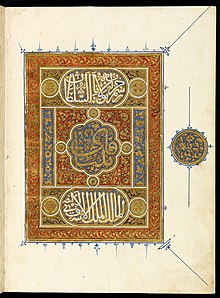Al-Burda
| Part of a series on |
| Muhammad |
|---|

Qasīdat al-Burda (
Bānat Suʿād, a poem composed by
Composition
The Burda is divided into 10 chapters and 160 verses all rhyming with each other. Interspersing the verses is the refrain, "My Patron, confer blessings and peace continuously and eternally on Your Beloved, the Best of All Creation" (Arabic: مولاي صل وسلم دائما أبدا على حبيبك خير الخلق كلهم). Each verse ends with the Arabic letter mīm, a style called mīmiyya. The 10 chapters of the Burda comprise:
- On Lyrical love yearnly
- On Warnings about the Caprices of the Self
- On the Praise of the Prophet
- On His Birth
- On His Miracles
- On the Exalted Stature and Miraculous Merits of the Qur'an
- On the Ascension of the Prophet
- On the Struggleof Allah's Messenger
- On Seeking Intercession through the Prophet
- On Intimate Discourse and the Petition of One's State.
Popularity
Sufi
, making it one of the most recited poems in the world.Translations
The poem has seen several different translations, into a variety of languages.[6] Arguably the most important translation of recent times is that by Timothy Winter into English.[7] The book was also translated into four different languages: Persian, Urdu, Punjabi and English by Dr. Muhammad Hamid.
Audio
The full rendition of this famous poem has been produced by The Adel Brothers. They have sung the full poem in over 20 different styles.[8]
Legacy
The Burda was accepted within Sufi Islam and was the subject of numerous commentaries by mainstream
Muhammad ibn Abd al-Wahhab considered the poem to be shirk (idolatory).[13]
See also
- Al-Busiri
- Durood
- Islamic poetry
References
- ^ Blair & Bloom 1995, p. 113.
- ^ James 1983, p. 26.
- ^ "Anthology of Arabic Poems about the Prophet and the Faith of Islam Containing the Famous Poem of Al-Busaree". Archived from the original on 2009-12-10. Retrieved 2009-11-11.
- ^ "The poem of the scarf by Shaikh Faizullah Bhai B. A. – University of Bombay – Published by Taj Company Ltd". Archived from the original on 2009-12-10. Retrieved 2009-11-11.
- ^ "BBC – Religions – Islam: al-Burda". Retrieved 2016-12-17.
- ^ See section, "Popularity"
- ^ "Imam al-Busiri, The Mantle Adorned", Timothy Winter (Abdal Hakim Murad), (London: Quilliam Press, 2009)
- ^ 'The Mantle of Praise', see 'External links' below.
- ISBN 9781135455965.
- ^ ISBN 978-9004187429.
- ISBN 9004078193.
- ISBN 9783110460001.
- ISBN 9781845110802.
The Wahhai mission.
Bibliography
- Blair, Sheila S.; Bloom, Jonathan M. (1995). The Art and Architecture of Islam. 1250 - 1800. Yale University Press. ISBN 9780300058888.
- James, David (1983). The Arab Book. Chester Beatty Library.
External links
- Qasida Burda – Qasida Burda (the nasheed)
- Al-Burda on the BBC
- Iqra.net: The Prophet's Mantle
- Translation of al-Burda and other resources
- MA Thesis: Understanding the Poem of the Burdah in Sufi Commentaries Archived 2012-02-04 at the Wayback Machine
- The Mantle Adorned a translation by Timothy Winter
- 'The Mantle of Praise' Full rendition of the Qasida Burda by The Adel Brothers
Further reading
- Muhammad in History, Thought, and Culture: An Encyclopedia of the Prophet of God (2 vols.), Edited by C. Fitzpatrick and A. Walker, Santa Barbara, ABC-CLIO, 2014. ISBN 1610691776
- La Burda du désert, Touria Ikbal, Faiza Tidjani & Muhammad Vâlsan, Edited by Science sacrée, 2015. ISBN 9782915059106
- Al Borda (Le manteau): Poème consacré à l’éloge du Prophète de l’Islam (sur lui la prière et le salut) Broché , TEMASAMANI Chebagouda Abdelhamid– 16 novembre 2020 ISBN 979-8560378806


